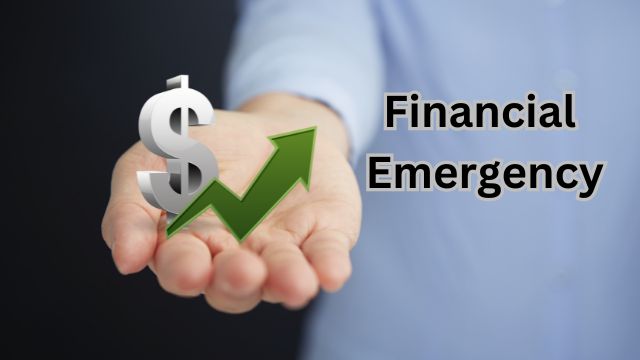When it comes to spending money out of your pocket, there are only two situations, either you need to spend the money right away because of something urgent, or it can wait. That means these financial decisions are divided into two categories, one is financial emergency and the other one is financial nonemergency. Correct? But if you are someone who wants to know a little more than just the definition of these two, then keep on reading because you are about to find that out. Here we will be listing the contrasting differences between a financial emergency and nonemergency. So yeah, let’s get down to it then, shall we?
What Even Is A Financial Emergency?

Think of a financial emergency as a surprise situation where you suddenly need money you didn’t plan on spending. These unexpected events pop up out of nowhere and can create a big headache if you’re not prepared. Let’s look at some real-life examples to get a clearer picture:
- Medical issues: See, health can be a roller-coaster. One moment you’re perfectly fine, and the next, you might be hit with a health problem that costs a lot to treat. Imagine having an accident or getting sick out of the blue. These health hiccups can lead to big bills. If you don’t have money saved up, you might have to make tough choices about your health and other daily needs.
- Losing your job: Jobs can be unpredictable. Sometimes, due to changes in the business world, you might find yourself without work. This can be super stressful, especially if you don’t have some money tucked away. You’ll need cash for things like rent, bills, and groceries. Without a job or savings, things can go downhill, leading to bigger money problems.
- Home issues: We all love our homes, right? But what if your roof starts leaking when it’s pouring outside? Or your heater stops working in cold weather? These problems aren’t just annoying, they’re urgent! If you don’t fix them fast, they can lead to bigger issues, cost even more money, and even be bad for your health.
- Car troubles: For most of us, our car isn’t just about driving around. It’s how we get to work, do our shopping, and handle emergencies. So, if your car suddenly breaks down, it’s a big deal. Fixing it can be costly, and if you can’t use your car for work or other tasks, it can make things really tough.
- Legal problems: Sometimes, out of the blue, you might face legal issues. Maybe someone sues you, or you need a lawyer fast. These situations can be pricey.
- Urgent trips: Yeah, there might be times when you need to travel suddenly. Maybe there’s a family situation or a sudden work trip. Booking things last minute can be pricey. If you don’t have spare cash, it can put you in a tricky situation.
What Exactly Is A Financial Nonemergency?
See, financial non-emergencies are things you might want to spend money on, but they aren’t that urgent. They don’t surprise you; you can see them coming. This means you can plan for them and save money over time. Let’s take a look at some usual non-emergencies:
- Fixing Up Your Home: Are you thinking of making your kitchen look better, adding a new room, or making your garden beautiful? Yeah, these changes make your home nicer and may increase its value. But, there’s no rush. You can do these when you’ve saved enough money. So yeah, that can wait.
- Certain Medical Treatments: Believe it or not, some medical treatments aren’t urgent. Things like beauty surgeries, eye treatments to get rid of glasses, or other optional surgeries can wait. You can take your time, look for the best doctors, and see if there are payment plans or insurance to help you out with that.
- Buying Fancy Things: We all love fancy things like the newest phone, stylish clothes, or cool accessories. But these things aren’t must-haves. Maybe wait for a sale, save a bit each month, or think about if you really need it. This helps keep your money safe.
- Investing: Everybody knows that investing helps your money grow. It can be in things like stocks, property, or even starting a business. But, take your time. Research well, ask experts, and wait for the best time to put your money in.
- Learning New Things: Maybe you want to learn something new, join a workshop, or take extra classes. That’s great! But if there’s no hurry, save up and plan it well. This way, you get the best without spending too much.
- Gifts and Fun Times: We all love birthdays, anniversaries, and special times. Giving and getting gifts is fun! But, you don’t have to spend a lot. You can easily plan your gifts early or decide on a budget. This way, you can have fun without worrying about money.
Key Differences Between Financial Emergencies and Nonemergencies
See, knowing the difference between financial emergencies and nonemergencies can help you manage your money better. Here’s how you can tell them apart:
1. Urgency
Emergency situations are things you need to handle right away. Think of it like a medical problem that can’t wait. If you don’t act quickly, things could get much worse. On the other hand, regular expenses don’t need a quick fix. Sure, updating your kitchen is great, but if you need to save up for it, that’s okay. It can wait!
2. Consequences
See, in emergency situations, waiting can lead to big problems. For example, if your heater breaks in winter and you don’t fix it, you could get sick or even damage your home. With nonemergencies, putting these off might be a bit of a letdown, but it’s usually not a big deal. Like, if you postpone a vacation, you might be bummed, but it won’t hurt you.
3. Planning
Emergency situations pop up out of nowhere! That’s why having some money saved just for emergencies is super important. And yeah, you can usually see nonemergencies coming. Let’s say you want a new car next year. You can start saving and checking out different cars ahead of time.
4. Duration of Impact
If you don’t handle financial emergencies right, you might be dealing with the cost for a long time. Like, if you get sick and don’t have insurance, that bill could hang around. On the flip side, once you spend on nonemergencies, that’s usually it. Buying something fancy might pinch your wallet now, but it’s a one-time thing unless you end up in debt.
5. Emotional Stress
Financial emergencies can really stress you out! The surprise combined with what could happen can make anyone anxious. But with the nonemergencies, you might be excited or a little nervous, it’s generally more chill. You have time to think, plan, and make sure you’re ready.
Quick Comparison Between Financial Emergency and Nonemergency
| Aspect | Financial Emergency | Nonemergency |
|---|---|---|
| Definition | Sudden, unexpected, and urgent financial needs. | Planned or routine expenses that can be anticipated. |
| Timing | Requires immediate attention and resolution. | Can be budgeted and addressed over a longer period. |
| Nature of Expense | Unforeseen expenses like medical emergencies, car accidents, etc. | Regular bills, groceries, entertainment, etc. |
| Impact on Budget | Significantly disrupts budget plans. | Fits within the established budget. |
| Source of Funds | Often requires tapping into emergency savings, loans, or other financial reserves. | Funded through regular income and savings. |
| Planning | Difficult to plan for in advance. | Can be anticipated and budgeted for. |
| Examples | Medical emergencies, sudden home repairs, unexpected job loss. | Monthly rent, groceries, utility bills, planned vacations. |
| Stress Level | High stress due to urgency and uncertainty. | Lower stress as these expenses are expected. |
| Financial Planning | Highlights the importance of an emergency fund. | Focuses on budgeting and long-term financial goals. |
| Insurance Coverage | May or may not be covered by insurance, depending on the nature of the emergency. | Typically not covered by insurance as these are routine expenses. |
| Prevention | Challenging to prevent, but having an emergency fund helps mitigate the impact. | Can be managed through regular budgeting and saving. |
Conclusion
Well, if you were confused up until this point, we hope that now you have a clear picture of what financial emergency or nonemergency situations look like. Right? Sure, there can be more examples of these situations, but we have listed the ones that you can relate to the most. By looking at real-life examples, you can surely make better financial decisions. Don’t you think?

Meet Suhas Harshe, a financial advisor committed to assisting people and businesses in confidently understanding and managing the complexities of the financial world. Suhas has shared his knowledge on various topics like business, investment strategies, optimizing taxes, and promoting financial well-being through articles in InvestmentDose.com


